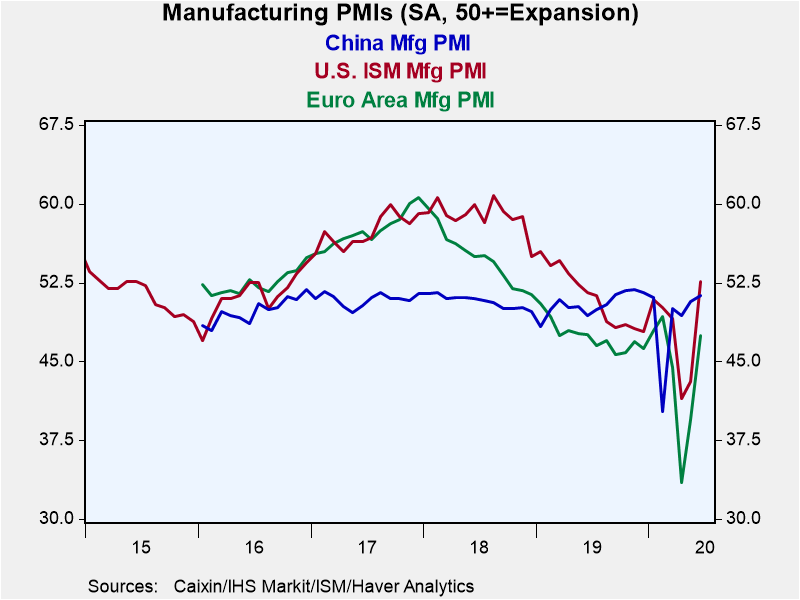 Global| Jul 01 2020
Global| Jul 01 2020Manufacturing PMIs Battle Back
Summary
Manufacturing sector PMIs battle back strongly in June with all countries reporting a value showing a gain in June over May. The average PMI value rose to 47.5 in June from 39.7 in May and that compared to 35.3 in April for most [...]
 Manufacturing sector PMIs battle back strongly in June with all countries reporting a value showing a gain in June over May. The average PMI value rose to 47.5 in June from 39.7 in May and that compared to 35.3 in April for most countries (Japan, Taiwan and Vietnam excluded). April was the low. And while there is a bit more variation in the ranking of this month's PMI standings, the average ranking at the 28.4 percentile is still a low one.
Manufacturing sector PMIs battle back strongly in June with all countries reporting a value showing a gain in June over May. The average PMI value rose to 47.5 in June from 39.7 in May and that compared to 35.3 in April for most countries (Japan, Taiwan and Vietnam excluded). April was the low. And while there is a bit more variation in the ranking of this month's PMI standings, the average ranking at the 28.4 percentile is still a low one.
A number of countries post relatively high rankings in June; among these is Malaysia at 92.3%, Turkey at 88.5% and China at 78.8%. Of the 16 countries and regions in the table, seven of them have PMI values above 50. But those with high queue standings have high readings more because of a poor history than because of such high PMI readings in June. For example, Malaysia's high queue standing couples with a PMI value of 51, Turkey's couples with a PMI value of 53.9, China couples with a PMI value of 51.2.
There are seven countries with manufacturing expanding and that is something. It is a very fast revival from the very weakest readings of April for most and May for some. The progression of the moving averages, from 12-months to six-months to three-months, continues to show a slowing in progress. That is because the turn up is still slow and the three-month average still contains the low-water marks for all countries.
The virus continues to be a factor spreading and setting back hopes for a fuller and ongoing reopening of economies. But many countries are showing relapses of sorts for a variety of reasons.
While doctors seem to have learned a lot about treating the virus and deaths have slowed, the virus does continue to spread and health official continue to be worried about that. Outside of Sweden, there is no place that seems to have embraced the concept of acquiring herd immunity. But most national strategies to protect those most vulnerable to the virus have failed. In the U.S., 40% of the covid-19 deaths have been in nursing homes. That's hardly the stuff of a potent virus.
Evidence still points to ongoing economic recovery as retail sales in Germany rebounded, rising 13.9% month-on-month. In Japan, consumer confidence is rising but remains at still very weak levels. In Chile, the spread of Covid-19 is gaining and economic activity fell by 15.3% in May from the same month of one year ago. The Southern hemisphere is battling a growing outbreak.
Geopolitical tensions continue to provide an uneasy back drop. China made its first arrests, 300 of them, in Hong Kong under the new laws adopted yesterday. In the U.S., anger is mounting over allegations that Russia paid bounties to the Taliban for killing U.S. soldiers and if this charge can be proven many want new sanctions on Russia. President Donald Trump in the U.S. is looking increasingly isolated as a large bloc of former Republican George W. Bush administration officials is reported to be ready to announce their support for Democrat Joe Biden.
On the trade front, the new U.S.-Canada-Mexico trade treaty, USMCA, takes effect today. The Baltic freight index has just reported out its 24th straight gain. That is good news. But the index has been rising after a period of weakness so its signal though going in the right direction consistently it is still not a strong one. But it is a hopeful trend that also is underpinned by todays improving PMI framework.
Robert Brusca
AuthorMore in Author Profile »Robert A. Brusca is Chief Economist of Fact and Opinion Economics, a consulting firm he founded in Manhattan. He has been an economist on Wall Street for over 25 years. He has visited central banking and large institutional clients in over 30 countries in his career as an economist. Mr. Brusca was a Divisional Research Chief at the Federal Reserve Bank of NY (Chief of the International Financial markets Division), a Fed Watcher at Irving Trust and Chief Economist at Nikko Securities International. He is widely quoted and appears in various media. Mr. Brusca holds an MA and Ph.D. in economics from Michigan State University and a BA in Economics from the University of Michigan. His research pursues his strong interests in non aligned policy economics as well as international economics. FAO Economics’ research targets investors to assist them in making better investment decisions in stocks, bonds and in a variety of international assets. The company does not manage money and has no conflicts in giving economic advice.
More Economy in Brief
 Global| Feb 05 2026
Global| Feb 05 2026Charts of the Week: Balanced Policy, Resilient Data and AI Narratives
by:Andrew Cates






